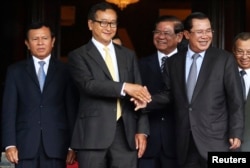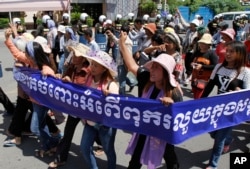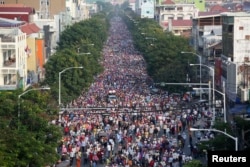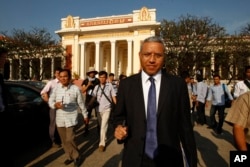Recent studies show that Cambodia’s democratic development is backsliding. For many Cambodians the future is unpredictable, creating a sense of uncertainty for many, while political freedoms are on the wane.
The ruling Cambodian People’s Party and opposition Cambodia National Rescue Party have worked since July to reform the political process, following 2013 elections the opposition says were marred by fraud.
But that process has done little good for democracy, the election watchdog Comfrel says in a new report, “Democracy, Election and Reform in Cambodia.”
“As of 2014, the political process in Cambodia faced many challenges that tended to undermine democratization process,” Koul Panha, executive director of Comfrel, said. “Rights to freedom of speech and public engagement were restricted to a degree that impeded free and fair elections.”
Political dialogue between the two sides has improved, creating election reform laws and the creation of a new National Election Committee, he said, but “the continuity of political improvement is highly uncertain.”
Human Rights Abuses
The exercise of political and civil rights is critically restricted, as “the security apparatus continued to use excessive force against protesters during demonstrations,” the Comfrel report says.
As of early February, the CPP added about 80 personnel in security force to its Central Committee. In an interview with VOA Khmer in Washington, Brad Adams, director of the Asia division for Human Rights Watch, said that creates “a huge conflict of interest.”
Law enforcement often sees people who excise their basic rights “as the enemy,” Adams said. “They are the citizens of the country. They deserve the same protection as the CPP’s rallies being held. No more, no less.”
The government has made no progress in terms of “promoting freedom of assembly and expression,” Comfrel says. To date 11 land rights activists remain in detention and sentenced to at least one year in prison, for exercising their rights to expression.
Corruption and Abuse of Power
The Comfrel report also finds that corruption remains a critical barrier to building transparent and accountable governance. Cambodia ranked 156 out of 175 states, showing a slight improvement from its rank at 160 in 2013, according to Transparency International.
“Corruption is very pervasive in the judiciary, followed by the justice system, which includes police departments and competent institutions that provide public services,” Preap Kol, executive director of Transparency International Cambodia, said.
Nonetheless, the government has made some efforts to eradicate corruption in public institutions, even though the independence of the National Council against corruption and the Anti-Corruption Unit has been questioned.
Seventy percent of officials, which accounts for 10,683 individuals, have declared their assets and liabilities over the past two years. “Overall, the situation of corruption is slightly improved,” Preap Kol said. “There is also an increased improvement in attitude change, understanding of, and measures in combating corruption among the general public.”
Abuse of power is still an issue, as government officials do work that tends to serve the interests of the political party. In its “Report on Political Irregularities: Misuse of State Resources and Political Corruption,” issued in February 2015, Comfrel finds that “there are 131 cases of irregularity of giving or gaining bribes, 60 cases of misuse of state resource for political interest, and 18 cases of nepotism and cronyism.”
That indicates “no improvement regarding nepotism and cronyism,” Preap Kol said. But he added that “there is public discussion and debate on the issue.” Still, nepotism can “create conflict of interest” and damage good governance.
Electoral Reform
Recognizing that free and fair elections are the key elements of democratization, the CPP and CNRP revised law on elections of national assembly and reformed the National Election Committee.
Among the 24 provisions of the Electoral Law, 15 provisions were an improvement, but nine others were backslides, Comfrel says.
The worst provisions restrict the campaign period to 21 days and limit street rallies to only four days, which “will limit an equal level-playing field for electoral competitions,” Comfrel says.
“There is a positive revision on voter registration, in which the two parties have the tendency to create new voter registration system,” Koul Panha said. “But there is a limitation of participation from civil society and independent institutions to monitor the election process.”
The revised law on elections fails to ensure peaceful “election defeat” by the two parties. Chheang Vannarith, a lecturer of Asian Pacific studies at the University of Leeds, said: “It is too early to say if the reform on electoral law can ensure free and fair elections.
However, he sees reform of the National Election Committee as “a positive move,” allowing the two parties to have equal representation and an independent individual sitting on the committee.
Judicial Reform
Meanwhile, the judicial system in Cambodia remains politicized, Comfrel says. The report claims that “judicial reforms continued to be blocked in 2014” due to “a lack of political will.”
Cambodia’s courts are “heavily politicized,” which means “anybody accused by the CPP or the government of corruption would be in a politicized court system,” Adams said.
“Unless there is independence and balance of power in the legislature, executive power and judiciary, the court system cannot be independent,” Keo Bunthea, a researcher in public interest laywer, said.
“Accountability is very critical to creating an independent judicial system, making sure that the court personnel use their power within their own jurisdiction,” said Nou Yothea.
Future Hope for Change
Still, there is hope that a culture of dialogue between the two parties will continue, creating room for more change in the future—much of that coming from demands of the people themselves.
“There is positive change in people’s perception toward fighting for freedom and human rights,” Keo Bunthea said. But “unless there is a change in attitude of people in leadership, nothing much will change.”














